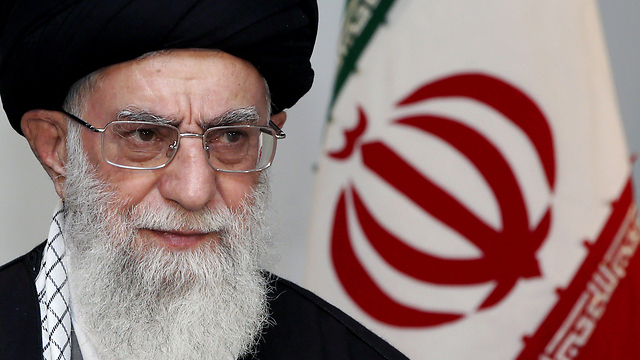Khamenei’s inflammatory statements and how the GCC can act
Dr. Majid Rafizadeh/Al Arabiya/Friday, 31 July 2015
In the past couple of weeks, Iran’s Supreme Leader Ayatollah Ali Khamenei felt the urge to reassert and strongly articulate the Islamic Republic’s policies towards its Arab neighbors and the United States. After announcing his support for the nuclear deal between the Islamic Republic and the six world powers (known as the P5+1: China, France, Russia, the United Kingdom, and the United States; plus Germany), Khamenei stated, according to the official website of the Office of the Supreme Leader, “whether this drafted [nuclear agreement] text is approved through legal process in the country or not, the Iranian nation will not stop supporting the oppressed nation of Palestine, Yemen, Bahrain as well as the nations and governments of Syria, Iraq and the honest combatants in Lebanon and Palestine.”
The supreme leader’s message with regards to Bahrain and Iran’s support for “Bahraini people” clearly reflects Iran’s meddling. Recent similar statements by Iranian officials have ultimately urged one country, and a state member of Gulf Cooperation Council, to act. Bahrain took well-informed diplomatic moves. First, they summoned a top Iranian official to express its protest with regards to Khamenei’s remarks. Second, Bahrain recalled its ambassador from Tehran for consultation. Since Iranian leaders’ ties with Arab countries are geopolitically, strategically and economically significant, Bahrain’s move and official statements can definitely constrain Iran from issuing the same inflammatory statements for sometime. This will prompt the supreme leader to calculate his words and policies more carefully next time. On the other hand, what does Khamenei’s speech tell us about Iran’s regional and foreign policy after the nuclear deal? How can we view Bahrain’s move? How can Iran be restrained and what steps must the Gulf Cooperation Council states take?
Khamenei’s policy
Khamenei is considered the second longest-ruling leader in the Middle East after Sultan Qaboos of Oman. One of the major reasons behind his long-ruling period is his dual policy of pleasing the hardliners (in order to suppress domestic opposition and spread Iran’s revolutionary principles abroad) as well as the moderates ( in order to set the international diplomatic tome and remove the risks of foreign intervention). But this double policy has inevitably created contradictions and has upset other nations. For example, with regards to Iran-U.S. policies, Khamenei stated “our policy toward the arrogant U.S. government won’t change at all… We have no negotiations with America about various global and regional issues. We have no negotiations on bilateral issues.”
Although some politicians and scholars put much emphasis on the literal translation of Khamenei’s words, it is crucial not to analyze some of the ayatollah’s words and speeches based on face value. On the one hand, Khamenei is attempting to silence (and please) his hard-line social base. In order to prevent their opposition and criticism to the sealed final nuclear deal, he is strongly voicing Iran’s hardline stance towards the United States and other regional countries.
Nevertheless, although the supreme leader has stated that Iran does not have “negotiations with America about various global and regional issues” and “negotiations on bilateral issues,” Tehran and Washington have been tactically cooperating with each other on several issues including fighting ISIS and the stability of Iraqi government, Afghanistan, among others. As I mentioned before the final nuclear was reached, although Khamenei was in favor of the nuclear deal, his public statements disguised his intentions. Iran-Bahrain and Iran-GCC: Iran can be constrained by a collective move from GCC states.
The supreme leader’s message with regards to Bahrain and Iran’s support for “Bahraini people” clearly reflects Iran’s meddling in the internal affairs of Bahrain. In addition, he attempts to please the senior cadre of Iran Revolutionary Guard Corps and its elite branch, the Quds force that implements Tehran’s regional policies. This dual policy of the supreme leader continues to create challenges and contradictions on the diplomatic, regional and global stage. For example, on the one hand, Iran’s Foreign Minister Javad Zarif announced Iran’s political willingness to start a new chapter with Arab countries. On the other hand, Iran’s supreme leader also gave speeches reasserting Iran’s meddling in Arab countries including Iraq, Syria, Yemen, and Lebanon. Part of the tension between Iran and Bahrain is due to these types of inflammatory statements given periodically by Iranian officials, such as calling Bahrain the 14th province of Iran and not recognizing Bahrain as independent state. The other factors are the close ties between Iranian and Shiite clerics in Bahrain as well as Iran’s meddling in internal affairs of Bahrain.
The best approach to constrain the Islamic Republic is that several Arab states or GCC members ought to take a collective move similar to the move taken by Bahrain. This move can be solely diplomatic. Strong statements from GCC states can indeed constrain such inflammatory statements. Nevertheless, will such statements alter Iran’s regional policy? To some extent. For Iranian leaders, their geopolitical, strategic, and diplomatic ties with Arab states are crucial since they desire to project the Islamic Republic as the front runner of the Muslim world, ideologically speaking. If Iranian leaders sense that the Islamic Republic might be boycotted by several Muslim Arab nations, they will likely begin to recalculate their priorities with regards to national and ideological interests.






















